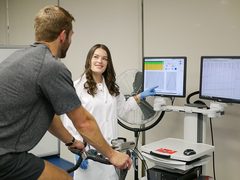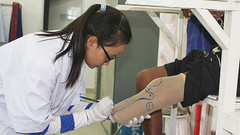Processing Request...
Processing Request...


Athletic trainers specialize in preventing, diagnosing, and treating muscle and bone injuries and illnesses. Exercise physiologists develop fitness and exercise programs that help patients recover from chronic diseases and improve cardiovascular function, body composition, and flexibility.
Learn More

Biomedical engineers analyze and design solutions to problems in biology and medicine, with the goal of improving the quality and effectiveness of patient care.
Learn More

Chiropractors treat patients with health problems of the neuromusculoskeletal system, which includes nerves, bones, muscles, ligaments, and tendons.
Learn More

Dentists diagnose and treat problems with a patient’s teeth, gums, and related parts of the mouth. They provide advice and instruction on taking care of teeth and gums and on diet choices that affect oral health.
Learn More

Dietitians and nutritionists are experts in food and nutrition. They advise people on what to eat in order to lead a healthy lifestyle or achieve a specific health-related goal.
Learn More

Emergency medical technicians (EMTs) and paramedics care for the sick or injured in emergency medical settings. People’s lives often depend on their quick reaction and competent care. EMTs and paramedics respond to emergency calls, performing medical services and transporting patients to medical facilities.
Learn More

Epidemiologists are public health professionals who investigate patterns and causes of disease and injury in humans. They seek to reduce the risk and occurrence of negative health outcomes through community education and health policy.
Learn More

Medical laboratory technologists (commonly known as medical laboratory scientists) and medical laboratory technicians collect samples and perform tests to analyze body fluids, tissue, and other substances.
Learn More

Medical scientists conduct research aimed at improving overall human health. They often use clinical trials and other investigative methods to reach their findings.
Learn More

Nurses or registered nurses (RNs) provide and coordinate patient care, educate patients and the public about various health conditions, and provide advice and emotional support to patients and their family members.
Learn More

Occupational therapy assistants and aides help patients develop, recover, and improve the skills needed for daily living and working. Occupational therapy assistants are directly involved in providing therapy to patients, while occupational therapy aides typically perform support activities. Both assistants and aides work under the direction of occupational therapists.
Learn More

Orthotists and prosthetists, also called O&P professionals, design medical supportive devices and measure and fit patients for them. These devices include artificial limbs (arms, hands, legs, and feet), braces, and other medical or surgical devices.
Learn More

Pharmacists dispense prescription medications to patients and offer expertise in the safe use of prescriptions. They also may provide advice on how to lead a healthy lifestyle, conduct health and wellness screenings, provide immunizations, and oversee the medications given to patients.
Learn More

Physical therapists help injured or ill people improve their movement and manage their pain. These therapists are often an important part of rehabilitation and treatment of patients with chronic conditions or injuries.
Learn More

Physicians and surgeons diagnose and treat injuries or illnesses. Physicians examine patients; take medical histories; prescribe medications; and order, perform, and interpret diagnostic tests. They counsel patients on diet, hygiene, and preventive healthcare. Surgeons operate on patients to treat injuries, such as broken bones; diseases, such as cancerous tumors; and deformities, such as cleft palates.
Learn More

Psychiatric technicians and aides care for people who have mental illness and developmental disabilities. Technicians typically provide therapeutic care. Aides help patients in their daily activities and ensure a safe, clean environment.
Learn More

Veterinarians care for the health of animals and work to improve public health. They diagnose, treat, and research medical conditions and diseases of pets, livestock, and other animals.
Learn More

Take our free psychometry test to discover your passion and potential!
Try It Now!

Book a campus tour through us!
Book Now!

Submit your result to Edumetry, and a list of scholarship that is eligible for your result will be filtered out for you!
Match Now!